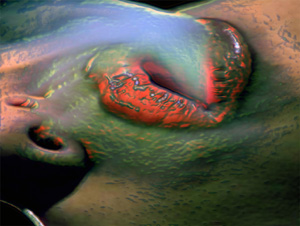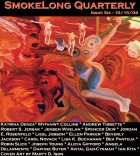English isn’t your native language, but much of your writing now is in English first, rather than translating from the original. Can you tell us some of the ways this affects your writing?
It affects my writing quite a lot. If I write in Dutch now I have more guts to write whatever seems necessary to create the right atmosphere. I do that in English with a small vocabulary and because of that I have to take risks with words that might fit a story, but in a weird way. I try to take the same risks in Dutch since I write in English.
A great deal of your writing focuses on your father. Do you think the decision to write was driven at all by that relationship?
No. My childhood didn’t create writers. I think only the stuff you read gave you that impression. I am not writing about my father, but about a man that exist only in my imagination. Characters in my stories are based on real persons, but no more than that. I re-create them in situations they never were. So, the father in ‘On The Inside Of A Horse’s Skull’ is merely just based on my father. He owned a horse’s skull, but only God knows where he got it. I never sat on it. In my imagination I sat on it. I rode it like a horse. I rode dead and bereavement in a garden in my mind’s eye.
Between the time that you wrote this and its publication, Christopher Reeve died. Was that a weird moment for you?
Christopher Reeve’s accident was quite a shock to me to begin with. I think he went trough some of the things I consider as one of the nightmares a person can have to go through. To lose your body before you die, must be horrible. To be captured in that body, must be even more horrible. He was amazing interesting as a person. I adored him for his optimism. His urge to walk again and his fight against something almost impossible. When I heard he had died I thought about the conversation in my story. The parents who fear the girl might break her neck riding a horse. The fear parents deal with because parents are so vulnerable in their children. The conversation about Christopher Reeve entered the story because in some way he was often in my mind. If life was shit I sometimes said to myself: ‘listen Buter, you aren’t in a wheelchair. Make something of it and move your lazy butt.’ But also because he had been a character in a hero-story for children.
What had happened to him frightened me. That he kept looking forward made me adore his personality. I like strong people. I like people who cling to life. I like optimists because optimism gives, it doesn’t takes.
Recently, you’ve started doing some artwork for FRiGG. How do visual art and writing affect one another in your life?
Well, it doesn’t affect one another that much, I think. But in every form of expressing myself I can see the same kind of surrealistic way of looking at the world. My writing and visual art are about how I look at human beings. I don’t trust anyone although people in my neighborhood believe I trust everyone. Maybe they need a shrink?


